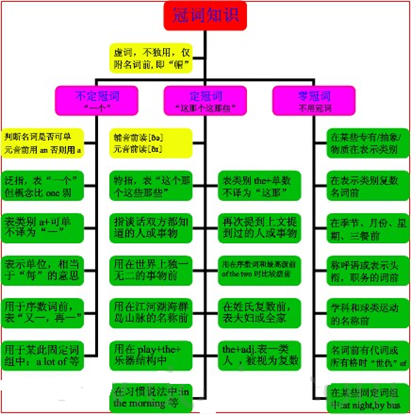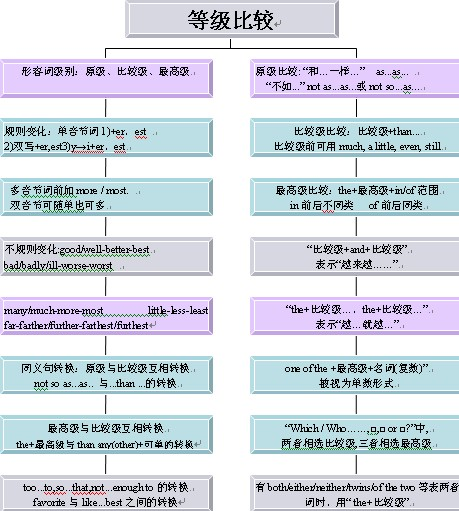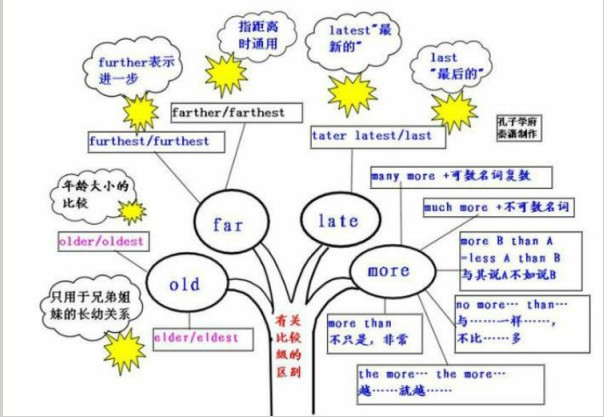本试题 “Bad luck! _____ I want to see that terrible big dog, _____ frequently I meet it.[ ]A. The less ;the lessB. The more ;the moreC. The less ;the more....” 主要考查您对定冠词
形容词的比较级
等考点的理解。关于这些考点您可以点击下面的选项卡查看详细档案。
- 定冠词
- 形容词的比较级
定冠词的定义:
定冠词the 有this,that,these,those等意义,但较弱,用于单数或复数名词前,主要用来特指,使一个或几个事物区别于所有其他同名的事物。
定冠词通常位于名词或名词修饰语前,但放在both、all、double、half、twice等词之后。
如:All the students in the class went out.班里所有的学生都出去了。
定冠词的用法:
1、表示特指:
如:Look! A car has stopped there. The car is beautiful. 瞧,有辆汽车在那儿停下了。那辆汽车可真漂亮。
Why not ask the teacher? 为什么不问问老师?
2、与单数可数名词连用表类别:
如:I hate the telephone. 我讨厌电话。
The cobra is dangerous. 眼镜蛇是危险的。
3、与某些形容词连用表示类别:
如:The rich are not always happier than the poor. 富人并不总是比穷人过得开心。
Theoldaremorelikelytocatchcoldthantheyoung.老年人比年轻人容易感冒。
4、用于独一无二的事物名词前:
如:The earth goes around the sun. 地球绕着太阳转。
The sky was blue and clear. 天空清澈湛蓝。
5、用于方向或方位等名词前:
如:He looked towards the east. 他朝东望。
Turn to the right at the second crossing. 在第二十字路口向右拐。
6、用于序数词或形容词的最高级前:
如:You will be the second to speak. 你第二个发言。
Autumn is the best season here. 秋季是这里最好的季节。
7、用于乐器名词前表示演奏:
如:He plays the piano very well. 他的钢琴弹得很好。
注:若不是从演奏角度来考虑,而是考虑乐器的实体,则不一定用定冠词:
He bought a piano for his son. 他为儿子买了部钢琴。
定冠词与不定冠词互换用法比较:
1、在形容词最高级前一般加定冠词。但有时却用不定冠词,这时它不表示“最”的意思,而表示“非常”“很”的意思。
如:This is the most important question of all. 这是所有问题中最重要的一个。
This is a most important question. 这时一个非常重要的问题。
2、在序数词前加定冠词,表示“第几”;加不定冠词则表示“又”“再”。
如:Will you be the firse to read the text? 你第一个读课文好吗?
Will you have a second try? 你再试一次好吗?
3、在有些短语中,用定冠词和不定冠词一样。
如:The number of our school students is about 1500. 我校学生人数约为1500人。
定冠词的用法口诀:
特指双熟悉,上文已提及;
世上独无二,序数最高级;
某些专有名,习语及乐器。
以上口诀归纳了用定冠词的一般情况,即:
①特指某些人或物
②谈话双方都熟悉的人或事
③上文已经提到的人或事
④世界上独一无二的事物前
⑤序数词回形容词最高级前
⑥某些专有名词前
⑦一些习惯短语(如:intheday等)中和乐器前(如:playtheviolin/piano)。
定冠词知识体系:

定冠词用法拓展:
1、用于姓氏的复数前,表示全家人或全家中两个或两个以上的人:
如:The Browns live next to us. 布朗一家就住在我们隔壁。
The Greens have no Children. 格林夫妇没有小孩。
2、用来代替前面已提到的人的身体部位或衣着等的一部分:
如:He hit me in the face. 他打我的脸。
He caught the thief by the collar. 他抓住小偷的衣领。
3、用于逢整十数词的复数名词前,指世纪中的年代或人的约略年岁:
如:He began to learn French in his fifties. 他五十多岁开始学习法语。
He went to Japan with his family in the sixties. 他在60年代带家人去了日本。
4、用于某些单数可数名词前,使意义抽象化,指其属性或功能等:
如:This colour is pleasant to the eye. 这颜色悦目。
He is fond of the bottle. 他喜欢喝酒。
5、表示计算单位,含有a, each, per 之类的意义:
如:He is paid by the hour (piece). 他拿计时(件)工资。
It sells at two dollars the pound. 这东西每磅卖两美元。
6、用于人名前,或特指、或比喻、或指其作品等;用于某些产品的名称前,指产品:
如:He likes the Picasso. 他喜欢毕加索的画。
Lu Xun has been known as the Gorky of China. 鲁迅人称中国的高尔基。
7、用于江、(运)河、海、洋以及山脉、群岛、半岛、海岛、海峡、沙漠等名称的前:
如:the Chang jiang River 长江
the Pacific(Ocean) 太平洋
the Suez(Canal) 苏伊士运河
①关于湖名前是否用冠词通常要分两种情况:
中国的湖名在英译时,其前通常加定冠词:
the West Lake 西湖,the Dong ting Lake洞庭湖。
而外国的湖名前,多数不加定冠词,少数加定冠词,视习惯而定:
Lake Success 成功湖,the Lake of Geneva日内瓦湖
②山名的构成有两种方式:
若用于“山名+Mountains”,其前常用定冠词:the Jing gang Mountains 井冈山;
若用于“Mount/Mt+山名”,则通常不用冠词:Mount Tai 泰山。
另外,若不出现mountain一词时,则通常要用冠词:theAlps阿尔卑斯山。
8、用于由普通名词或含有普通名词构成的专有名词 (如国名、地名、政党、团体、组织机构以及旅馆、商店、学校、医院、文娱场所、建筑物等)前:
如:the United Nations 联合国
the People's Republic of China 中华人民共和国
the National People's Congress 全国人民代表大会
注:大学名称的构成要注意以下情况:
①对于以地名命名的大学,通常有两种形式 (注意冠词的有无):
如:the University of London / London University 伦敦大学
②对于以人名命名的大学,通常只有一种表达(不用冠词):
如:Yale University 耶鲁大学
Brown University 布朗大学
形容词比较级概念:
大多数形容词(性质形容词)有比较级,用来表示两个人或事物之间的比较“较……”。
如:I am taller than you.
形容词比较级特殊用法:
1、没有比较对象的比较结构:
所谓没有比较对象的比较结构不是指省略而言,而是指并非真正的比较。
例如:The car runs faster than110 miles. 那辆车时速为110多英里。
There is more than one solution to the problem. 这个问题的解决办法不止一个。
The daily cost in an average hospital in the United States can run as high as $250. 在美国普通医院的每天的费用可高达250美元。
2、用比较级的形式表达最高级的意思:
在这种情况下,往往是将一个人或是一件事与其他所有的人或事相比较。注意别忘了常在比较状语中用any, other, else类的字眼,以将比较主体排除在比较对象以外,因为自己不可以与自己相比较。
例如:He is taller than any one else in our class. 他在我们班比其他任何都高。
Iron is more useful than any other metals. 铁比其他任何金属更有作用。
3、no+比较级+than的结构表示“A和B一样不……”:
例如:She runs no faster than her sister.她与她妹妹一样跑不快。
Tom is no wiser than John. 汤姆和约翰一样没有聪明才智。
He is no richer than his brother. 他与他弟弟一样不富有。
4、汉语可以说“昆明的气候比兰州好”。英语必须加that:
例如:The climate of Kunming is better than that of Lanzhou.
5、英语比较级常译作“较…”、“…一些”等,但不等于汉语的“更…”。汉语的“更…”须用“still”或“even”来表示:
如:This book is even more difficult than that one. 这本书比那本书更难。
6、有些情况下,汉语不用“较”等字眼,英语则须用比较级:
如:Will the younger people give their seats to old people? 请年轻人把座位让给老年人好不好?
形容词比较级的用法:
1、比较级用于二者的比较,其结构是:含有形容词比较级的主句+从属连词than引导的从句(从句中常省去意义上和主句相同的部分)。
如:Li is older than Zhou. 李比周年纪大。(从句中省去了is old)
There are more children in this nursey than in that one. 这个托儿所的孩子比那个托儿所多。(从句中省去了there are children)
After two years' physical training, she is healthier and stronger. 经过两年的体力锻炼,她(比以前)健康强壮多了。(注意这里省去了从句than she was)
We are much better off than ever before. 我们的生活比过去任何时候都要好得多。(than后省去了we were)
Paul weighs less than harry. 保尔的体重比哈利轻。
Mary is less clever than Jane. 玛丽不如简那么聪明。
2、可修饰比较级的词:
1)a bit, a little, rather, much, far, by far, many, a lot, lots, a great deal, any, still, even等
2)还可以用表示倍数的词或度量名词作修饰语。
3)以上词(除by far)外,必须置于比较级形容词或副词的前面。
典型例题:
1)—Are you feeling ____?
—Yes,I'm fine now.
A. any well
B. any better
C. quite good
D. quite better
答案:B. any可修饰比较级,quite修饰原级,well的比较级为better.
2)The experiment was____easier than we had expected.
A. more
B. muchmore
C. much
D. moremuch
答案:C. much可修饰比较级,因此B,C都说得通,但easier本身已是比较级,不需more,因此C为正确答案。
3)If there were no examinations, we should have___at school.
A. the happiest time
B. a more happier time
C. much happiest time
D. a much happier time
答案:D.
注:many, old和far用法:
1)如果后接名词时,much more+不可数名词 many more+可数名词复数
2)old有两种比较级和最高级形式:older/oldest和elder/eldest。elder,eldest只用于兄弟姐妹的长幼关系。
如:My elder brother is an engineer.
3)far有两种比较级,farther,further在英语中两者都可指距离。在美语中,father表示距离,further表示进一步。
如:I have nothing further to say.
3、比较级中的两个特殊作用的结构:
1)The+比较级+句子,表示的意义是“越(怎么样就)越(怎么样)”,在这个结构中的两个“比较级”不要求一定词性相同,它们各自的词性要依句子的需要而定;
2)和比较级+and+比较级。表示的意义是“越来越(怎么样)”,在这个结构中的两个“比较级”则要求词性相同。
例如:The harder you work at your study, the better academicrecords you will have. 你学习越努力,你的成绩就越好。
The more we have, the more we want. 人欲无穷。
When winter is coming, it gets colder and colder. 冬天来临之际,天越来越冷了。
He became less and less satisfied with the foot ball team's performance. 他对足球队的表现越来越不满意了。
形容词比较等级知识体系:

特殊形容词比较级变化:

与“Bad luck! _____ I want to see that terrible big dog, ____...”考查相似的试题有:
- -Where did she find________old pictures?-She found them in the drawer by________accident.[ ]A./;/B.the;theC.the...
- Book three is ______ most difficult book,but is isn’t ______ most difficult one in Senior school books.A.a;aB.a;the...
- It was ________ surprise that my first teacher, already 90, was still living and in ________ good health.A.the; aB....
- — Where did she find ________old pictures?— She found them in the drawer by ________accident.[ ]A. /;/B. the; theC. t...
- He told ______ lie to his friends that he was heavily in _______ debt because he wanted to borrow some money from the...
- At ____ present we are going through a hard time, but I’m sure ____ things will get better in the near future.A.the;...
- On the celebration of the university’s 100thbirthday, he said, “I have never experienced __________ time here as a gr...
- In my view, London's not as expensive in price as Tokyo but Tokyo is ______ in traffic.A. the most organizedB. more o...
- Everything is so expensive now.It is hardly ___ to save money.A.probableB.likelyC.possibleD.feasible
- The more careful you are while writing a composition, ________.[ ]A. you make the fewer mistakesB. the few mistakes w...